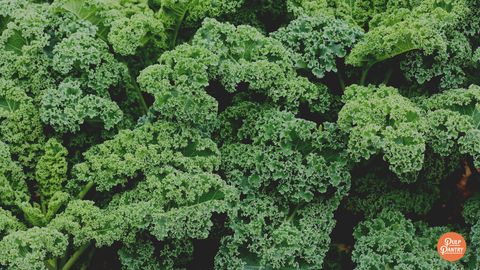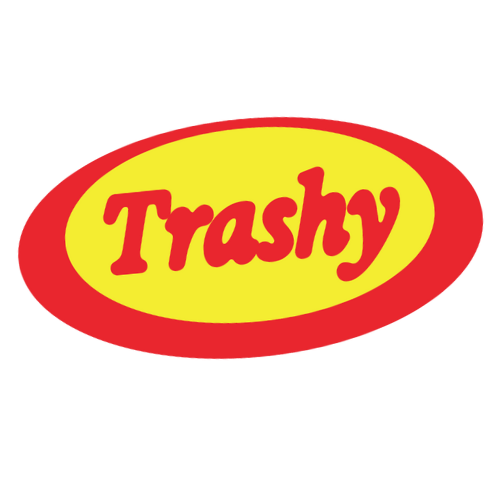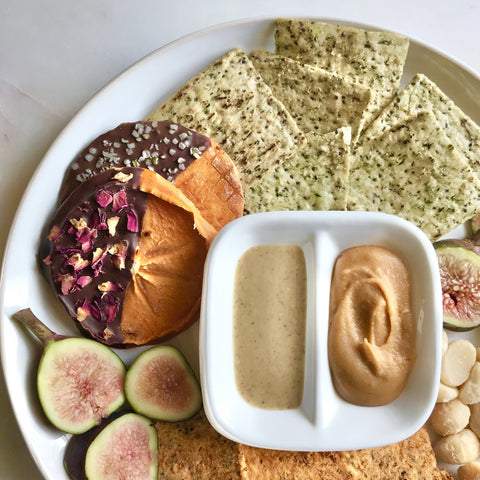
Move over, keto. There's a new way of thinking when it comes to adopting a diet that's better for our health, and the health of our environment. And no, it doesn't necessarily require going full vegan.

Nowadays, it’s so easy to waste resources without even batting an eyelash. As consumers, we hardly even touch the waste we produce, let alone see it. Our economy is built on a linear model of consumption today, one in which we extract vast resources to take → make → waste.
Across the world, 76% of the calories grown by the industrial food system are wasted. The fact of the matter is, we’re part of the problem. As consumers, our waste alone amounts to $124.1 billion, which is nearly 63% of the total retail value of wasted food. It’s estimated that each of us contributes about $643.95 worth of avoidable waste per year (Ellen MacArthur Foundation).
By now, you have some background on the interconnectedness of the food we eat and how it impacts environmental health. We’re ready to think global by acting local - starting in our homes.
Where are some places to start making climate activism a part of your everyday life at home?

- Education’s importance to empower us to take action cannot be overstated. Just by reading the basic content we’ve put out there, and exploring the links we’ve shared, you’re already helping yourself stay woke about our responsibility as consumers. Help educate others!
- The more we learn, the more we have the power to make decisions and create new habits that are in line with our values -- no marketer can persuade us otherwise.

- Animal agriculture costs the world $1.81 trillion per year, equivalent to 134% of its production value (FAO). The less we rely on animal proteins, the more efficiently we can produce the food required to feed our planet. More natural resources are used to produce meat, especially water and millions of acres of rainforest are slashed and burned to turn land into grass pastures for livestock.
- Animal products have a disproportionate climate impact because of their relatively high emission footprints. Animal products account for 30% of all wasted food by weight, but nearly 57% of the emissions (FAO).
- This doesn’t mean you have to go vegan! Start by looking at your plate differently. Swap veggies and whole grains as the center of every meal, and think about meat as an accompaniment. Here's what your plate might look like:
- Swap in plant-based proteins like lentils, beans, peas, and chickpeas - you can season and prepare these similarly to meat so that you’re not giving up on your favorite flavors.
- Visualize the environmental impacts of your protein sources using this chart:


- Save your scraps and make your food last! Cook with scraps, freeze your scraps to use in smoothies or sautees, save scraps to drop off at a farmer’s market or compost hub, or plant in your backyard. Check out some of our favorite recipes here.
- Educate yourself on date labels (for the most part, they're pretty arbitrary! You can get away with keeping food much longer than date labels may tell you), and establish more flexible guidelines so that you don't unnecessarily waste food. Use this app to help guide your decisions before throwing food away.

- Consider joining your local farm co-op for a community-supported agriculture delivery (search “name of your city, farm CSA” to find options near you), or getting groceries delivered from a brand like Imperfect, Good Eggs, Milk & Eggs, Misfits Market, GrubHub, Farm Fresh to You. Even your local grocery store can deliver produce nowadays! These boxes will come without (most) packaging on produce and will save you from having those moments when you’re in a pinch and realize you have no food at home.
- Did you know there are tons of shops around your town where you can shop low waste or BYOB? Co-ops, farmer’s markets, and even bulk-purchasing sites online. Save money, too. Bring your produce bags to the grocery store, leave them stocked in your car or your bag, so that you can always avoid plastic while you shop.
- If you don’t have a local co-op or are looking for more specialty items to jazz up your cooking, you can find bulk herbs, spices and more online at Mountain Rose Herbs and Frontier Organics.
- Eat organic. Reduce our reliance on pesticides, antibiotics, fertilizers, and other harmful pollutants.

- Nut-milk makers, grain cookers, crock pots, these are your new best friends to make purchasing package-free items plus cooking at home a piece of cake. Crockpots are a great place to put odds and ends of your veggies to use in stocks and soups, grain cookers will make it easy for you to make anything from quinoa to rice to lentils at home.
- Check out our favorite tools here!

- Meal prep! Some top tricks and tips here.
- There are a ton of zero waste Tupperware options to support your busy lifestyle. Take a look at the package free shop's online store for options, and your local co-op market should have similar take out containers you can stock up on for home. We love the Stasher bag and tiffins.
Your everyday choices can help you live in line with your values and can be a huge part of the everyday activism we need to fight the climate crisis.
Have any other ideas not mentioned here? We want to hear how you’re making a difference every day. Tag us on social @pulppantry with your ideas or send us a note.

About Pulp Pantry:
Pulp Pantry turns overlooked resources like upcycled vegetable juice pulp into wholesome everyday snacks that make it convenient and delicious to eat more servings of vegetables and fiber.
Our newly launched Pulp Chips are vegetable-based, tortilla style chips made from fresh, upcycled vegetables as the first ingredient. Pulp Chips are a craveable better-for-you, better-for-the-planet snack with up to a full day's serving of fiber in each bag.






